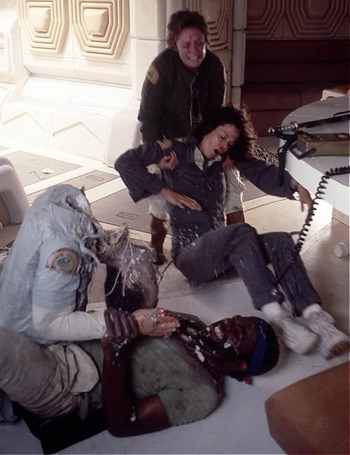One point of contention between Alien fans is whether or not the androids in the series can feel pain, or if they merely mimic it. Ash displays no physical signs of discomfort upon being beaten and decapitated. He even musters a celebratory, smug smile. Bishop does not notice that he has cut his finger during his knife-trick aboard the Sulaco until Hudson points out the bleeding, and he later shows no pain when partially dismembered in Alien 3, only difficulty in functioning. Finally, Prometheus’ David also shows no pain when being torn asunder by the Engineer.
Rebuttals point out that Bishop groans and contorts in agony when the Alien Queen impales and lifts his body at Aliens’ climax. A counter-rebuttal asserts that, as a sentient being, an “artificial person”, Bishop can express shock and surprise – in fact, he is expressly designed to do so. As a machine, he can also experience severe malfunction, which is expressed during the scene in his groans and grimace. Being impaled and torn in two would result in an incredible amount of trauma, and would elicit the maximum response, even from a synthetic being. Additionally, once the shock of being impaled and hoisted has passed, Bishop displays no further pain. Like Ash, he also manages a smile. “Not bad for a human.”
So does Bishop feel pain, or does he merely mimic it? Or are his gasps and contortions a reflexive response to catastrophic damage, short circuits, sensory overloads, severed connections, etc? The androids in the series are manufactured beings, products designed to mimic humans. Their entire emotional palettes are therefore a ruse. In Prometheus, David dons a spacesuit and breathing apparatus despite not needing to do so. When asked why, his answer is that he is programmed to do so, to put his human ‘masters’ at ease. The androids are designed to close the uncanny valley between man and machine. This not only allows for better integration between the two, but allows the humans to accept the androids in their midst. Of course, this is later used against them, as we see with Ash, who perfectly infiltrates the Nostromo on behest of the Company.
Muddying the waters somewhat is Bishop’s line in the infirmary in Alien 3. “I hurt, Ripley.” Are we to take his words at face value, or are they figurative? “It’s dark in here, I’m not what I used to be … I’m a glorified toaster.” Could Bishop be figuratively referring to the massive damage wrought on his intellectual capabilities and circuits? He has no internal organs to hemorrhage, or else the Queen’s attack would have been fatal, and his blood does not fulfill the same function as human blood, else he, Ash, and David would have ‘bled’ to death after their injuries.
Blurring the lines are the androids’ apparent emotional responses and personal interests. Ash “admires” the Alien. Bishop is fascinated by the facehugger. David is vain (he dyes and styles his hair) and can appreciate art (Lawrence of Arabia is a favourite). Of course, emotional appreciation does not mean that the androids can experience the full breadth of emotional and physical responses. They can understand and experience, in some form, pleasure, fascination, admiration, etc, but do they feel the psychosomatic flushes, flutters, and jolts of joy and agony that are coupled with physical and emotional experiences?
Going further than the trilogy for a moment: the android Annalee Call from Alien Resurrection functions more like Ash, in that she passes almost completely for a human being and expresses joy, disdain, and contempt – the difference being that her emotional responses seem self-directed, rather than pre-programmed. She is an “auton”, a machine created by machines, that are apparently closer to the real thing (humans) than their ancestors. Shock and surprise afflicts Call, but lingering pain does not seem to be a factor – she is shot, ‘drowns’, and yet returns with no lasting after-effects. In one scene she inserts a needle into her arm and winces – but in the context of the scene, whether this response is made out of discomfort with her android nature (she is belittled and subsequently embarrassed for being synthetic) or actual pain, is contestable. More to the point: as a second generation ‘auton’, Call is far beyond the androids of the earlier films, and by extension the prequel Prometheus.
Alien series androids: master mimics who blur the lines between real and unreal/man and machine, or thinking and feeling contraptions?






Creating a race of androids as crafty as these is just begging for trouble! Imagine when they realized they’re a race of slaves and turned their powers of mimicry against the human race….
Perhaps a point of contention, however, I feel you’ve provided reasonable counterpoints to each issue to my satisfaction.
I really like what I’m seeing here (started to follow only a week or two ago).
I always assumed Bishop’s ‘I hurt’ line refers to broken pride stemming from the fact that he has been diminished and will never be the same. A sense of pride and/or vanity seems in some way to be a part of the personality of every AP we have seen on the screen. An emergent property of being able to think critically while also knowing you are superior in every way to most of the population around you maybe?